Final Fantasy Crystal Chronicles Remastered Edition Review
Final Fantasy Crystal Chronicles has always held a sort of nostalgic mystique for me. As a young child, I never managed to finish the original Gamecube version, despite absolutely adoring it in the handful of hours that I managed to put into the cozy, divergent style of Final Fantasy game. Getting three friends together, scrounging up four Game Boy Advances with link cables, and allocating the time to play it together, simply proved to be too many hurdles for a group of middle schoolers to ever reach the end credits. But I still think back very fondly on those lazy weekend nights of trekking through a variety of cool dungeon motifs, experimenting with spell combinations, and of course, fighting over who has to carry the chalice.
When I first heard of a remaster that would allow me to play a new, touched up version of the game with a modern online infrastructure, I found myself filled with a sort of naïve childlike enthusiasm at the thought of simply being able to see through what had been left unfinished. Unfortunately, changes made to the fundamental way in which the new take on multiplayer is designed into Final Fantasy Crystal Chronicles Remastered Edition has left me profoundly disappointed. Instead of revisiting a nostalgic piece of my childhood, I ended up finding an experience that felt far less special and, more importantly, far lonelier.
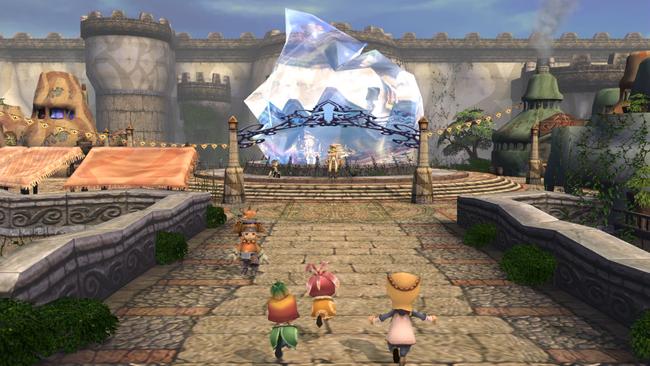
Crystal Chronicles’ premise is centered around the threat of miasma, a poison mist that threatens to engulf the world. Each year, towns send out groups of explorers in parties known as Crystal Caravans, tasked to find a magic dew called myrrh that can ward off the mist for a time. It’s a perfectly simple setup that’s more than adequate for the story-lite nature of the game.
Instead of focusing solely on a start-to-end narrative at the forefront, Crystal Chronicles instead centers around a series of chance encounters on the trail, perfectly symbolized in the uneven bobbing of a wagon, wheels spinning over a dusty yet well-traveled road. Of course, some of this is a deliberately baked-in façade, with specific encounters metered out in specific years, but the illusion works well, and it’s a sort of style that I wished more games followed. In this way, Remastered Edition largely preserves one of more unique aspects of the Gamecube original.
The majority of the time isn’t spent on the road, though. Myrrh, the key material caravans set out to collect, is found at the end of various dungeons that dot the land. These range from natural locations where monsters happen to habit, to specifically knocking down a Gigas Lord’s manor door to retrieve the myrrh stashed within. Dungeons environments are pleasantly varied, with differing levels of puzzles, optional paths, environmental design, and accompanying soundtracks. Enemies found within each dungeon are also surprisingly diverse as well, comprised of spellcasters, flying brutes that attack from distance, and mace-wielding mooks that love to leave players staggered. There’s a great level of interplay between these systems that’s well designed for multiple players to collaborate and specialize.
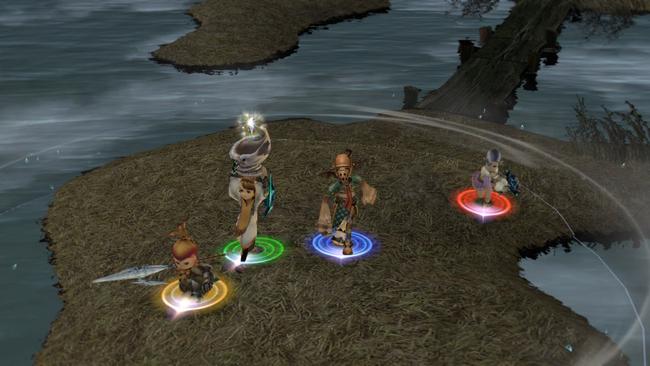
Dungeons end up being the primary way in which characters progress in their capability as well. Instead of enumerated levels that signify a character’s ability, a key type of item called Artifacts are used instead. Throughout and at the end of each dungeon, each player will be able to select a specific item based on how well they cleared the location, with the options available and the selection order between players dependent on their individual bonus objective, such as inflicting damage or opening treasure chests. These artifacts have basic stat improvements attached to them, such as a bonus to strength or the available number of hit points. These are acquired at the end of each dungeon even if a drop of myrrh isn’t present, and are the primary motivation to run through a specific location multiple times, alongside acquiring location-specific materials.
Unfortunately, the way this all comes together in this online-only interpretation of the original is where new, severely frustrating limitations start to become evident. You see, Crystal Caravans are comprised of multiple party members, each with specific traits or family histories. Specifically, eight characters across four races can be created to fill in various roles from the town of Tipa -- for instance, the Clavat son of the town Blacksmith, or the Selkie daughter of the town Alchemist. In the original design of the Gamecube original, each player would decide on a character in the caravan with these choices in mind, and players would team up to travel together, explore towns, and conquer dungeons, all as part of the same caravan. Each race is specifically talented in different ways, and each family role would also play a part in the party’s ultimate construction.
Largely due to the online-only nature of the Remastered Edition, this is mostly entirely lost, though the specific issues are a bit more nuanced than simply lamenting the lack of a local multiplayer option. Chiefly, instead of members of your town’s caravan being allocated amongst multiple players, now each player is in charge of their entire caravan. It might take a careful reading to truly realize all the various ways that compromise what was set in the original game.
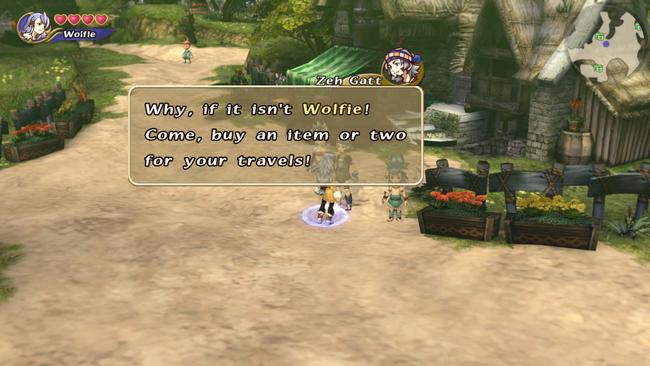
Instead of multiple players loading into Tipa to speak to the various townsfolk, buy new items, or craft gear, this is now a wholly single-player aspect of the game. All eight characters of your specific caravan are now effectively only alternates for one player to switch between. Your friends cannot play as part of your caravan, and you cannot explore towns together. Cutscenes viewed on the world map are single-player. Anything not-in-a-dungeon is single-player.
Because each player now controls their own caravan, individual characters of your caravan must now progress independently of each other. What this means is that Artifacts earned on one character are not shared amongst your caravan’s constituents. As a specific example, if you play through a handful dungeons earning new artifacts for one character (your ‘main’), swapping to another character is effectively starting from scratch -- your seven other characters will have not progressed past their starting stats. Considering even the game’s earliest dungeons get progressively more difficult as the in-game years pass, this means acquiring artifacts alternate characters becomes quite a hassle. In the original Crystal Chronicles, you at least had the option to progress your caravan participants at the same time in multiplayer. There is no way to do that in Remastered.
Since your hometown’s capabilities (such as its merchant options and crafting) also depend on playing as multiple characters, this also becomes a source of frustration. If you play primarily as the Blacksmith family member, for instance, your town Merchant will never get newer items for sale, and your Tailor will only ever be able to craft the most basic of accessories. In the multiplayer design of the original, this worked out okay since up to four characters would ideally progress through the game in parallel, each slowly working on their builds, gaining gear and artifacts, and improving their family trade. Now, however, the whole caravan belongs to the player, and they have to progress one character at a time.
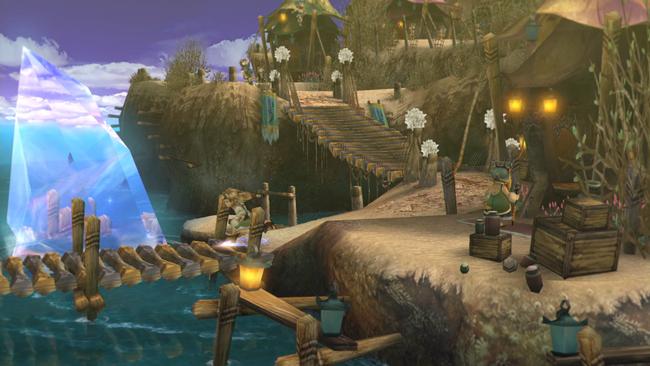
Dungeons may be the one place where the traditional multiplayer component is preserved, but even then it comes with some severe caveats. You see, joining up with friends or randoms to party for a dungeon uses a relatively simple lobby system. Hosts can keep open invitations for other players to join their lobby for particular dungeons, and an ID system very similar to Nintendo Friend Codes can be used to add players in-game to create friend-only rooms. Players who party up can follow each other as well. On paper, it works as expected, and the ability to join dungeons already in progress is a nice level of QoL.
I ran into a couple of issues early on finding players to join with, but after adding a couple of players to my friend list, I found that I had a reasonably easy time to create or join lobbies and start playing dungeons in multiplayer. My first time playing in a party was marked with severe input lag, with the host character rubber-banding across my screen as my connection went in and out – culminating in me disconnecting during the boss fight. My second and third time playing with a party admittedly went smoother after setting up my PS4 with a wired connection.
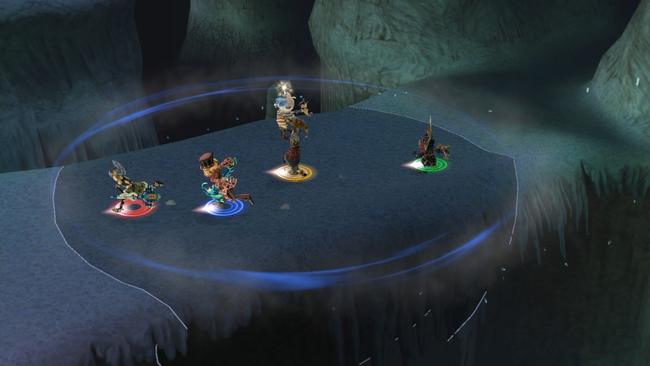
Outside of technical consideration, though, a key factor here is that party host and joined players are treated differently when it comes to progressing through dungeons. When I partnered with an ally to take on a dungeon with an active myrrh tree at the end, we were both in a position to end our first year with one more drop of myrrh. Upon finishing the dungeon, however, only the host received progress for the myrrh, while I, the joining player, was returned to my ‘world state’ after disbanding the party – still one drop of myrrh short.
This isn’t a bug, but seemingly the intended design. Joining up with a host in a dungeon is effectively like allying as a player-controlled companion for their file. Joining players will be able to keep materials and artifacts that they earn in this manner, but they cannot progress anything related to the story. While this means that running a dungeon multiple times for materials and artifacts is viable, progressing through the game start to finish with friends is unwieldy at best and unfeasible at worst. Outside of magicite and food, you cannot even share drops with an allied party member; there’s no giving a weapon scroll you don’t need to your ally has been trying for hours to get it. You can’t even enter a different dungeon without disbanding and reforming the lobby.
So effectively in Remastered Edition, Crystal Chronicles is now a single-player game with an option to tackle dungeons in multiplayer. On principle alone, there’s nothing inherently wrong with this setup, but by stripping out the intended local multiplayer components without proper consideration for these new limitations, the result is a disjointed product that does neither single-player or multi-player well. Either designing a newer title with these caveats in mind, more foresight given to the sorts of adjustments needed to better fit Crystal Chronicles into this new sleeve, or the ability to more accurately emulate the local multiplayer as it originally was would have all made for a much more cohesive and less lonely experience. As it stands, none of this is in place.
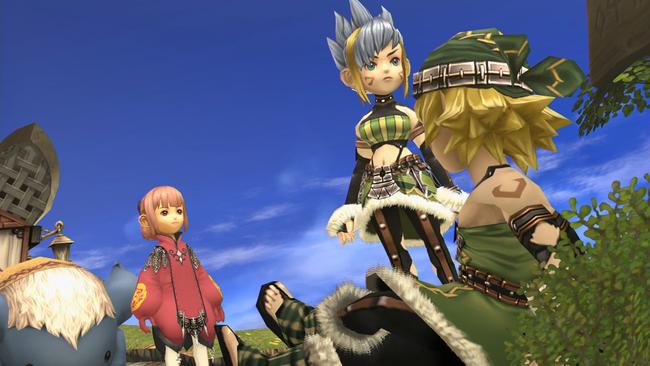
Outside of the Remastered Edition's disappointing implementation of multiplayer, much of the the original game's charm is still present. The wonderful cozy and childlike art and tone is still there. The relaxing and delightful music is as great as ever. It's just that the experience of actually playing the game is so hamstrung by its poorly set multiplayer systems.
I haven’t brought up the new post-game dungeon adjustments or the new Mimic system, simply because at some level, they felt fairly inconsequential, and honestly barely registered for me. Upon beating the main story, all the original dungeons undergo a slight redesign, with the original bosses sporting another coat of paint at the end with a newer, higher tier of materials and weapon scrolls to be gathered. Collecting Moogle Stamps (or shelling out for some DLC content) allows players to also shift their character appearance whenever in dungeons. Neither of these things really moved the needle in terms of enthusiasm on my end.
Final Fantasy Crystal Chronicles is still a serviceable action RPG as a single-player game, and playing the dungeon content in a party with the known limitations in mind can be enjoyable in spurts, but the whole feels stripped almost bare of what originally made it unique. My renewed excitement for a remastered version of Crystal Chronicles was centered around revisiting a classic with modern multiplayer infrastructure in mind, instead, I found a product that clearly feels unfit for its new interpretation and unfaithful to the original.